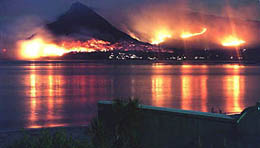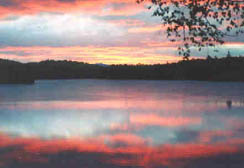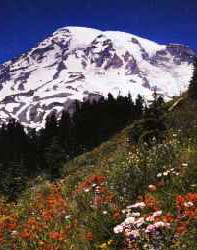 |
|
| Fire Mountains in Java |
 |
|
|
|

Java has many ancient stories to tell of terrible upheavals.
The giant demon king lives on a huge mountain in the west of Java. The mountain is so heavy that the whole island is in danger of sinking. The goods ask the demon king to leave the mountain. He refuses. A fierce battle begins. The gods win, and Java is saved. They tear apart the demon’s mountain and scatter the pieces all over the island. And to ensure its equilibrium, they create another mountain in the east, called Kawa Ljen.
Kawa Ljen has erupted twice in the last 30 years, claiming lives with its lethal gases. But most Javanese of the region have no time for the gods and demons of old: they are Muslims and come here for profit, not worship. Giant iron tubes probe the mountain’s core to tap its gases. These solidify into heavy yellow crystals of pure sulphur. Each day, 200 workers risk their lives to harvest it.
 Two hundred miles to the west lies another part of the story, the Tennger Massif, formed when the gods threw the demon king’s mountain across Java. It’s home to a quarter of a million Hindus. For them the fire mountains are the abode of the gods. Two hundred miles to the west lies another part of the story, the Tennger Massif, formed when the gods threw the demon king’s mountain across Java. It’s home to a quarter of a million Hindus. For them the fire mountains are the abode of the gods.
Most revered of all, the great Mount Bromo, is home to the Hindu god Brahma who created the world by churning the milky ocean. There are only a few Hindus on Java nowadays, and most of them live in the Tennger Mountains around Bromo. They are all that’s left of the once mighty Hindu kingdom that ruled most of Java and the surrounding islands.
The Javanese owe much to the volcanoes. Over the millennia the thick ash has so enriched the soil that up to 3 crops of rice can be planted each year.
But Java is now so crowded, and work is hard to come by. In the villages of East Java around Kawa Ljen, all the young men want to be sulphur miners, despite the risks. As Muslims, they scorn the sprits of the fire mountains. They now the material rewards are substantial.
 译文: 译文:
爪哇岛有许多关于地壳变动的可怕传说.
有一个故事说鬼王住在爪哇岛西部的一座大山上。这座山非常沉重,使整个岛屿都面临下沉的危险。众神让鬼王离开,鬼王不同意。于是战争开始了。最后众神战胜了鬼王,爪哇岛得救了。众神摧毁了鬼王的山,并将其碎片撒到整个岛上。为了确保重量均衡,众神在岛的东面又建造了另一座大山,叫作卡瓦林山。
卡瓦林山在过去的三十年中喷发过两次,致命的毒气夺去了许多人的生命。但是这个地区的大多数岛民可顾不上这些神鬼之说,他们是穆斯林,到这里来是为了赚钱,而不是为了敬神。人民将巨大的铁管插入山的核心将其中的硫磺气导出来。这些气体会凝结成沉重的黄色纯硫磺晶体。每天有二百名工人冒着生命危险开采这些硫磺。
往西二百英里外就是故事的另一座山—腾格尔高地。大约有二十五万印度教徒在这里安家。这些人认为火山是神的住所。
这些山中最让人崇敬的是巨大的布罗莫峰,这是印度神梵天的居所,据说他用搅动海洋的方法创造了这个世界。当前,在爪哇岛印度教徒并不多,他们大多数都住在布罗莫附近的腾格尔山。他们是一度强大的印度王国统治大部分爪哇岛及周围岛屿时留下来的人们的后代。
爪哇岛的居民从火山那里得到了不少好处。数千年来,厚厚的火山灰孕育了这里肥沃的土壤,稻谷可以一年三熟。
但是现在爪哇岛人口越来越密集,人们很难找到工作。在爪哇岛东部卡瓦林山附近的村子里,年轻男子都愿意冒险去开采硫磺。作为穆斯林,他们不相信火山的神灵,他们知道物质回报才是真的。
(CCTV-2, “Earth Stories”, Jan. 17)
(by Zhou Qianbin)
|
|
|
|
|
|
|
|
 |



